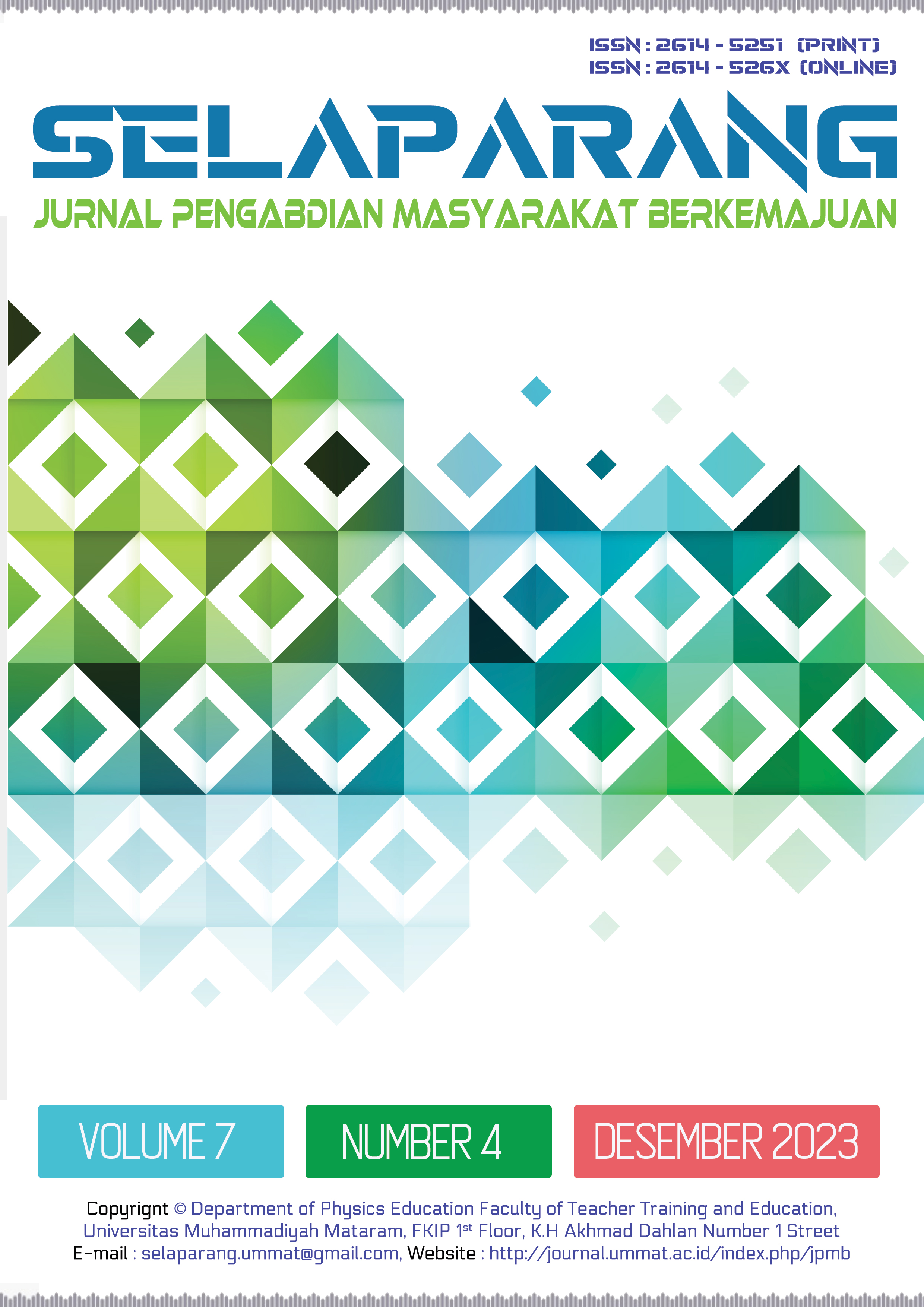PENDEKATAN PENGELOLAAN SAMPAH TPA REGIONAL KEBONG KONGOK
DOI:
https://doi.org/10.31764/jpmb.v7i4.21004Keywords:
waste management, landfill, spatial data analysisAbstract
ABSTRAK
Permasalahan sampah merupakan permasalahan yang banyak melibatkan berbagai pihak dalam pengelolaannya terutama di Tempat Pembuangan Akhir (TPA). Salah satu langkah dalam melakukan pengelolaan sampah adalah dengan melakukan identifikasi berbagai permasalahan yang dihadapi pihak pengelola bersama masyarakat sekitar TPA. Â Oleh karena itu, Kegiatan Pengabdian ini bertujuan untuk mengidentifikasi tantangan pengelolaan sampah di Tempat Pembuangan Akhir (TPA) Regional Kebon Kongok di Desa Sukamakmur, Lombok Barat. Metode yang digunakan dalam kegiatan ini adalah metode observasi dan wawancara di lokasi TPA. Kegiatan ini banyak melibatkan berbagai pihak terutama pihak pengelola TPA bersama masyarakat sekitar. Berdasarkan kegiatan iniditemukan bahwa distribusi sampah di TPA ini tidak merata, dengan adanya titik-titik kritis dan zona penumpukan sampah yang memerlukan perhatian khusus. Infrastruktur pengelolaan sampah yang terbatas, seperti fasilitas pemrosesan yang kurang, juga menjadi hambatan utama. Dampak lingkungan dan sosial ekonomi dari TPA ini belum sepenuhnya tergambarkan secara rinci, namun ada indikasi dampak sosial ekonomi terhadap masyarakat sekitar. Partisipasi masyarakat dalam program pengelolaan sampah masih rendah, dipengaruhi oleh persepsi negatif terhadap sampah dan ketidakpastian terkait manfaat partisipasi. Sebagai solusi, edukasi dan kesadaran masyarakat menjadi kunci untuk meningkatkan partisipasi. Penyesuaian program dengan konteks lokal dan pemberdayaan masyarakat melalui pendekatan inovatif juga diusulkan.
Â
Kata kunci: pengelolaan sampah; tempat pembuangan akhir; analisis data spasial
Â
ABSTRACT
The waste problem is a problem that involves many parties in its management, especially at final disposal sites (TPA). One of the steps in managing waste is to identify various problems faced by the management together with the community around the landfill. Therefore, this Community Service Activity aims to identify the challenges of waste management at the Kebon Kongok Regional Final Disposal Site (TPA) in Sukamakmur Village, West Lombok. The method used in this activity is the method of observation and interviews at the landfill location. This activity involves many parties, especially the landfill management and the surrounding community. Based on these activities was found that waste distribution in this landfill is uneven, with critical points and zones of waste accumulation requiring special attention. Limited waste management infrastructure, such as insufficient processing facilities, also poses a major obstacle. The environmental and socio-economic impacts of this landfill have not been fully detailed, but there are indications of socio-economic effects on the surrounding community. Community participation in waste management programs is low, influenced by negative perceptions of waste and uncertainty about the benefits of participation. As a solution, community education and awareness are key to increasing participation. Adjusting programs to local contexts and empowering communities through innovative approaches are also proposed.
Â
Keywords: waste management; landfill; spatial data analysis
References
Alawiyah, T., Haryono, G., & Putra, B. (2022). “MENUJU TARAKAN ZERO WASTE “ PENGELOLAAN SAMPAH PLASTIK DENGAN METODE ECOBRICK di KELURAHAN SELUMIT PANTAI TARAKAN TENGAH. Indonesian Journal of Fisheries Community Empowerment, 2(1). https://doi.org/10.29303/jppi.v2i1.505
Asiyah, N. (2019). KEBIJAKAN PEMERINTAH KOTA LANGSA TERHADAP PENGELOLAAN SAMPAH DALAM MEMENUHI PRINSIP GOOD ENVIRONMENTAL GOVERNANCE. Jurnal Hukum Samudra Keadilan, 14(2). https://doi.org/10.33059/jhsk.v14i2.1920
Hasanah, M. U., Selomo, M., & Ibrahim, E. (2021). FAKTOR YANG BERHUBUNGAN DENGAN PENGELOLAAN SAMPAH MAKANAN DI RUMAH MAKAN SEKITAR UNIVERSITAS MULAWARMAN. Hasanuddin Journal of Public Health, 2(2). https://doi.org/10.30597/hjph.v2i2.13619
Nurunnisa, S. (2021). Kajian dampak lingkungan sistem pengelolaan sampah di kawasan wisata Pantai Pariaman menggunakan metode life cycle assessment. Jurnal Teknologi Dan Inovasi Industri (JTII), 1(2). https://doi.org/10.23960/jtii.v1i2.21
Pravasanti, Y. A., & Ningsih, S. (2020). BANK SAMPAH UNTUK PENINGKATAN PENDAPATAN IBU RUMAH TANGGA. BUDIMAS : JURNAL PENGABDIAN MASYARAKAT, 2(1). https://doi.org/10.29040/budimas.v2i1.1015
Priatna, L., Hariadi, W., & Purwendah, E. K. (2019). “Pengelolaan Sampah di Tempat Pembuangan Akhir (TPA) Gunung Tugel, Desa Kedungrandu, Kecamatan Patikraja, Kabupaten Banyumas.†Prosiding Seminar Nasional Dan Call for Papers, 9(1).
Rimantho, D., & Tamba, M. (2021). Usulan strategi pengelolaan sampah padat di TPA Burangkeng Bekasi dengan pendekatan SWOT dan AHP. Jurnal Ilmu Lingkungan, 19(2). https://doi.org/10.14710/jil.19.2.383-391
Sucahyo, F. M., & Fanida, E. H. (2021). INOVASI PENGELOLAAN SAMPAH MENJADI PEMBANGKIT LISTRIK TENAGA SAMPAH (PLTSa) OLEH DINAS KEBERSIHAN DAN RUANG TERBUKA HIJAU (DKRTH) SURABAYA (Studi Kasus di Tempat Pembuangan Akhir (TPA) Benowo Surabaya). Publika. https://doi.org/10.26740/publika.v9n2.p39-52
Winahyu, D., Hartoyo, S., & Syaukat, Y. (2019). STRATEGI PENGELOLAAN SAMPAH PADA TEMPAT PEMBUANGAN AKHIR BANTARGEBANG, BEKASI. Jurnal Manajemen Pembangunan Daerah, 5(2). https://doi.org/10.29244/jurnal_mpd.v5i2.24626
Downloads
Published
Issue
Section
License
The copyright of the received article shall be assigned to the journal as the publisher of the journal. The intended copyright includes the right to publish the article in various forms (including reprints). The journal maintains the publishing rights to the published articles.

Selaparang : Jurnal Pengabdian Masyarakat Berkemajuan is licensed under a Creative Commons Attribution-ShareAlike 4.0 International License.

